Digital Poster
Brain Tumors: Acquisition & Reconstruction
ISMRM & ISMRT Annual Meeting & Exhibition • 10-15 May 2025 • Honolulu, Hawai'i

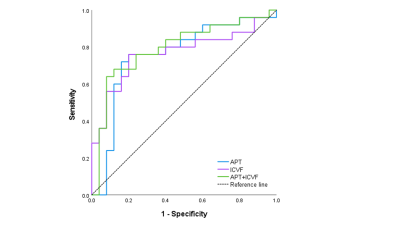 |
Computer Number: 113
2373. Application
of Combined APT and NODDI Imaging Techniques for Diagnosing IDH
Mutations in Diffuse Glioma
C. Tang, L. Chen, Y. Xu, W. Cui, Z. Zeng
The First Affiliated Hospital of Guangxi Medical University, Nanning, Guang, Nanning, China
Impact: The combined APT and NODDI imaging approach
offers an accurate, non-invasive method for predicting IDH
mutations in diffuse gliomas, improving diagnosis and
enabling personalized treatment.
|
|
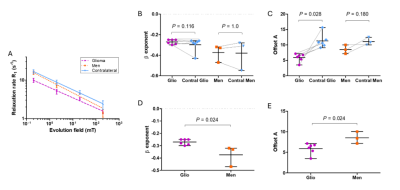 |
Computer Number: 114
2374. Field-Cycling
imaging detects brain tumours at low magnetic field strengths
V. Mallikourti, J. Ross, G. Davies, H. Lahrech, D. Lurie, L.
Broche, A. Rana
University of Aberdeen, Aberdeen, United Kingdom
Impact: FCI can detect brain tumour and discriminates
glioma from meningioma. Tissue dispersion may also be a
marker of aggressiveness. These offer interesting prospects
for clinical applications.
|
|
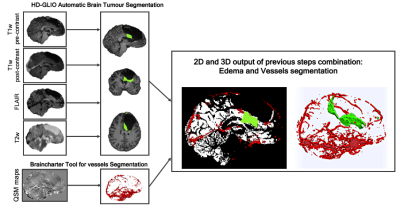 |
Computer Number: 115
2375. QSM
Maps Highlight Distinct Vascular Characteristics Across Glioma
Subtypes
E. Patitucci, S. Zappalà, J. Powell, N. S. Iqbal, R. Wise,
M. Germuska
Cardiff University, Cardiff, United Kingdom
Impact: Brain tumour subtype and aggressiveness
influence vascular parameters in surrounding tissue, with
higher demand observed in more aggressive tumours. This
relationship can be captured with quantitative
susceptibility maps (QSM) and it can offer valuable insights
for tumour diagnosis and characterization.
|
|
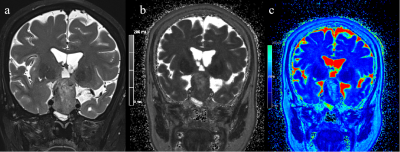 |
Computer Number: 116
2376. T2
mapping for evaluating consistency of pituitary macroadenomas: a
preliminary study
C-Q Su, Y-C Hsu, T. Kober, S-S Lu
The First Affiliated Hospital of Nanjing Medical University, Nanjing, China
Impact:
Accelerated T2 mapping provides a reliable, noninvasive method to predict pituitary adenoma consistency preoperatively, outperforming T2W imaging. This enhances surgical planning and potentially improves patient outcomes through more accurate assessment of tumor characteristics within a feasible clinical workflow. |
|
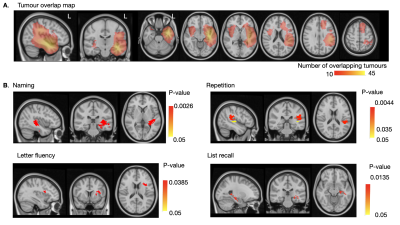 |
Computer Number: 117
2377. Cortical
and connectome-based predictors of cognitive impairment in
glioma patients
N. Voets, S. Jbabdi, P. Plaha
University of Oxford, Oxford, United Kingdom
Impact: Better understanding of how gliomas affect
functional networks and their underlying axonal connections
is essential to improve individualised predictions of
surgical treatability and likely associated performance
outcomes.
|
|
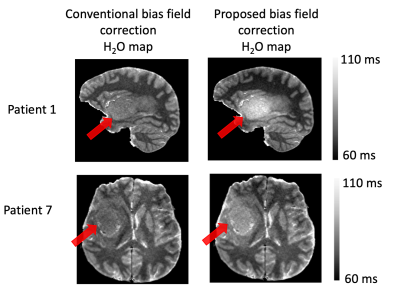 |
Computer Number: 118
2378. Correction
of receiver profile bias in brain tumors using T1 maps for
accurate water content mapping
D. Thomas, M. Ghazouani, A. Manzhurtsev, E. Hattingen, K.
Wenger
Goethe University Frankfurt, University Hospital Frankfurt, Institute of Neuroradiology, Frankfurt am Main, Germany
Impact: Current methods for H2O-mapping
in brain tumors have bias field estimation inaccuracies.
Here, T1-maps were used to correct for these inaccuracies
and results evaluated in 24 patients. Large tumors had a
significant increase in water content after the proposed
correction.
|
|
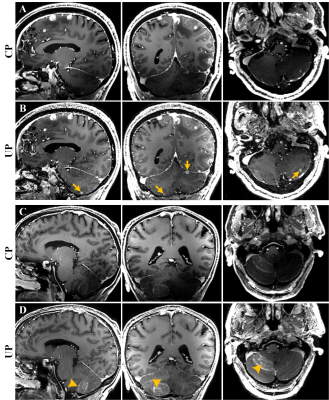 |
Computer Number: 119
2379. Clinical
feasibility of contrast-enhanced 7T MPRAGE with universal pulses
for evaluating intracranial enhancing lesions in oncology
patients
C. Duan, X. Bian, S. Wang, J. Qu, X. Lou
The First Medical Center, Chinese PLA General Hospital, Beijing, China
Impact: This study may facilitate the clinical potential
of contrast-enhanced 7T MPRAGE for evaluating enhancing
intracranial lesions in oncology patients.
|
|
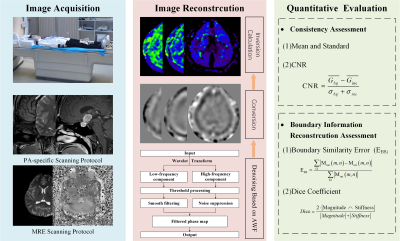 |
Computer Number: 120
2380. Enhancing
Consistency Estimation and Boundary Reconstruction in MRE-Based
Pituitary Tumor Assessment Using Adaptive Wavelet Filtering
S. Wang, C. Liu, T. Chen, K. Ai, Z. Jia, C. Jin, X. Li, J.
Dai, J. Yang
Department of Radiology, The First Affiliated Hospital of Xi'an Jiaotong University, XIAN, China
Impact: The proposed method significantly improves
wavefield image quality, enhancing the accuracy of MRE-based
pituitary tumor consistency estimation and boundary
reconstruction. This advancement provides precise lesion
details, aiding in optimal surgical planning and entry
strategy selection in clinical practice.
|
|
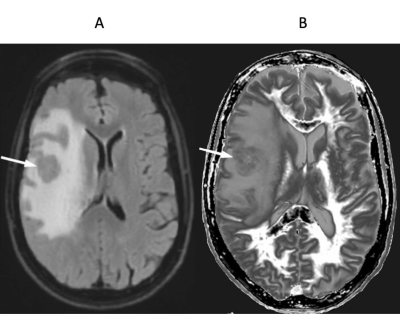 |
Computer Number: 121
2381. Ultra-High
Contrast (UHC) MRI of White Matter Surrounding Cerebral Tumours
Using Divided Subtracted Inversion Recovery Sequences
P. Condron, D. Cornfeld, M. Bydder, T. Emsden, G. Newburn,
S. Holdsworth, G. Bydder
Mātai Medical Research Institute , Gisborne, New Zealand
Impact: Ultra-high contrast (UHC) divided subtracted
inversion recovery (dSIR) sequences were applied to patients
with cerebral tumours to observe changes in surrounding
white matter. Widespread bilateral symmetrical abnormalities
were seen in white matter which appeared normal with
conventional imaging.
|
|
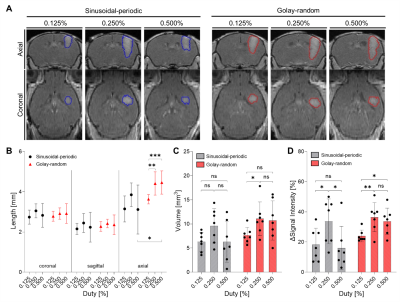 |
Computer Number: 122
2382. Targeted
BBB Opening with Golay-coded Ultrasound to Enhance Treatment of
Glioblastoma
T. Jang, H. Lee, S. Chang, O. Park, S. H. Choi, J. Park, R-E
Yoo
Seoul National University, Seoul, Korea, Republic of
Impact: Golay-coded ultrasound enables precise BBB
opening in targeted regions and can be a foundational
adjunct technology to improve drug delivery efficiency,
which could potentially be applied clinically to treat
various brain diseases.
|
|
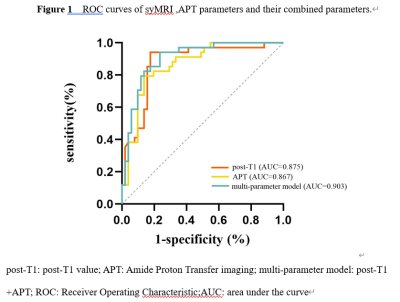 |
Computer Number: 123
2383. The
Value of synthetic MRI Combined with Amide Proton Transfer
Imaging in Predicting IDH1 Gene Status in Gliomas
M. Sun, X. Wang, G. Han, Y. Xiong, X. Ge, W. Ma, Y. Jin, F.
Niu, J. Zhou
General Hospital of Ningxia Medical University, Ningxia, China
Impact:
The combination of synthetic MRI and APT provides a novel and reliable non-invasive diagnostic method for predicting IDH1 gene status, offering an valuable imaging approach for the development of personalized treatment plans and prognostic assessments in clinical practice. |
|
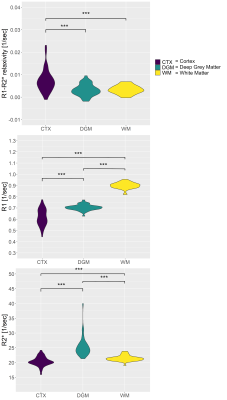 |
Computer Number: 124
2384. R1-R2*
relaxivity captures altered iron homeostasis in normal appearing
contratumoral brain regions of glioblastoma patients
A. Galimberti, S. Mangesius, J. Mangesius, J. Kerschbaumer,
C. Freyschlag, U. Ganswindt, E. Gizewski, C. Birkl
Medical University Innsbruck, Innsbruck, Austria
Impact: This study explores iron homeostasis in the
“non-affected” hemisphere in glioblastoma patients. R1-R2*
relaxivity model could serve as a valuable non-invasive
biomarker for iron homeostasis, potentially allowing early
detection of recurrence and guiding clinical decision making
and treatment planning.
|
|
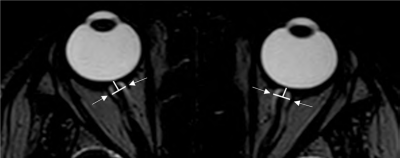 |
Computer Number: 125
2385. The
clinical application of MR measurement in predicting
cerebrospinal fluid pressure in patients with non-small cell
lung cancer
X. Liang, X. He, Z. ZHU, Y. Lin, Z. Yin, X. Zhang, B. Zhang
The Affiliated Drum Tower Hospital of Nanjing University Medical School, Nanjing University, Nanjing, China
Impact: The utilization of MR for measuring ONSD and
PCSFV/ICV provides a valuable means to assess variations in
CSFP among patients diagnosed with NSCLC⁃LM.
|
|
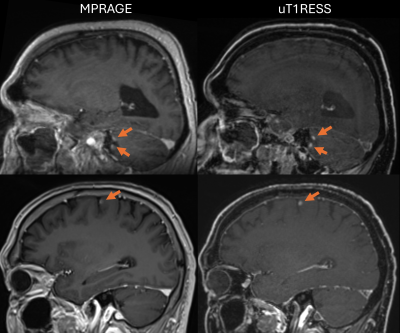 |
Computer Number: 126
2386. Prospective
Comparison of Brain Tumor Detection and Characterization Using
Post-contrast Dixon uT1RESS and MPRAGE at 3 Tesla
A. Tóth, R. Edelman, M. Hagar, D. Kravchenko, J. Eernisse,
M. Vecsey-Nagy, M. Spampinato, A. Varga-Szemes
Medical University of South Carolina, Charleston, United States
Impact: Dixon uT1RESS significantly improved the
detection of small metastatic lesions and evaluation of
vascular and dural involvement compared to MPRAGE. It may
enhance tumor management in brain metastasis patients,
though additional sequences might be needed to fully
characterize enhancing lesions.
|
|
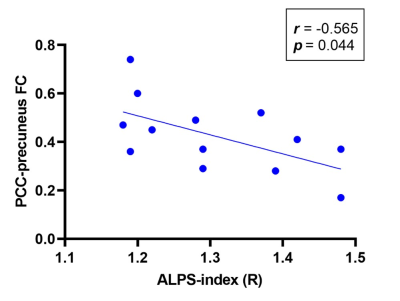 |
Computer Number: 127
2387. Impairments
in Functional Connectivity and Glymphatic System in Breast
Cancer Patients Undergoing Treatment
Q. Gu, L. Tang, N. Vafaie, C. Gong, P. Kragel, J. Bai, H.
Mao
Emory University, Atlanta, United States
Impact: Altered DMN-based functional connectivity and
bilateral ALPS-index, as well as the negative correlation
between elevated posterior cingulate cortex-precuneus
connectivity and ALPS-index in BC, indicate a potential
mechanism overcoming glymphatic dysfunction by enhancing
functional interactions.
|
|
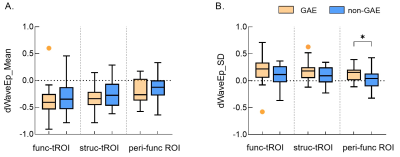 |
Computer Number: 128
2388. Dynamic
Brain Entropy of Peritumoral Region in Patients with Glioma
Associated Epillepsy
S. Cai, Z. Fan, Z. Qi, Z. Shi, L. Zhang
Shenzhen Institute of Advanced Technology, Chinese Academy of Sciences, Shenzhen, China
Impact: The fMRI-based dynamic wavelet entropy analysis
provides a macroscopic metric to characterize the aberrant
dynamic fluctuations in resting brain activity of
peritumoral regions in patients with glioma-associated
epilepsy.
|
The International Society for Magnetic Resonance in Medicine is accredited by the Accreditation Council for Continuing Medical Education to provide continuing medical education for physicians.